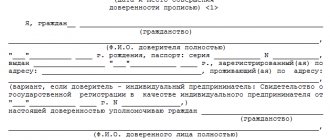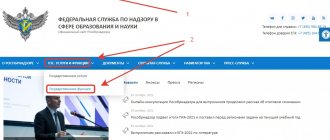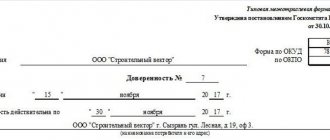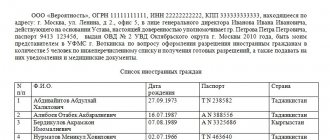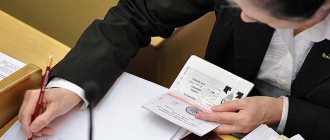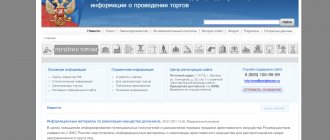The norms of the Civil Code of the Russian Federation give the right to conclude a transaction on behalf of one of the parties and represent its interests. This is discussed in Chap. 10 of the Code. The document certifying this right is a power of attorney issued to the representative. The other party to the transaction has the opportunity, and often the need, to verify its authenticity. The complexity and degree of reliability of such verification depends on the type of power of attorney. How to check the authenticity of a power of attorney, who can do this, what information is needed for verification, we explain in our material.
How to check the validity periods of orders and powers of attorney ?
When is a power of attorney required?
It is worth noting that since 2014, cases of fraud have become more frequent when concluding various transactions on the basis of a power of attorney issued by a notary. How does this happen? Fraudsters enter into contracts on the basis of a document that, for example, has lost its force or has been revoked by the principal. Accordingly, such transactions are declared invalid by a court decision. As a result, the buyer (if something was purchased) is left without money and without the purchased property.
There are cases when scammers use powers of attorney that were never issued.
They forge forms and seals of existing notaries. Without a thorough check, it will not be possible to detect such a fact of forgery.
The power of attorney must be checked in such cases.
:
- concluding agreements between individuals;
- when purchasing real estate or other property;
- concluding transactions between legal entities and individuals;
- registration of permission to dispose of property, and so on.
It is imperative to check the power of attorney when purchasing real estate. After all, scammers use exactly this method of selling.
By law, verification of the authenticity of a power of attorney is not mandatory. This is more of a recommendation when concluding any transactions to ensure buyer protection.
Article 185 of the Civil Code of the Russian Federation states that the authority of a representative of an individual or legal entity is confirmed by a power of attorney certified by a notary. It is issued for a certain period. It must indicate the powers of the representative.
Why check them?
The need to verify powers of attorney is dictated by the practice of concluding transactions and related cases of fraudulent activities.
So, scammers can use:
- a completely false power of attorney, which was not actually issued;
- an expired power of attorney, which for this reason no longer has legal force;
- revoked power of attorney, powers under which are terminated at the will of the principal.
Is it necessary to check the power of attorney of a representative of the Federal Tax Service when conducting a tax audit?
Transactions concluded on the basis of these documents are invalid and may subsequently give rise to legal proceedings. Often this situation leads to financial losses for one of the parties. This conclusion can be drawn from Art. 174 and 183 of the Civil Code of the Russian Federation.
By the way! Not only the parties to the transaction and their representatives, but also representatives of the investigation, courts, bailiffs, and notaries can carry out verification.
Who has the right to check the authenticity of a power of attorney?
Firstly, these are the persons who are directly involved in the transaction. Secondly, investigative and judicial authorities and their representatives. Thirdly, legal representatives in whose name the power of attorney was issued.
Until 2021, third parties could not participate in document verification. This rule was enshrined in law. They could only check that the power of attorney was filled out correctly.
Such measures were taken based on laws and regulations regarding the confidentiality of information about documents.
Since 2021, everything has changed. FNP (Federal Chamber of Notaries) has opened a service where you can easily verify the authenticity of a power of attorney. This has significantly reduced the number of illegal transactions.
Procedure for issuing inventory items by proxy
When releasing goods and materials at the Supplier's warehouse, before the start of shipment, the Buyer's representative must provide the warehouse manager with the original passport and a properly executed original power of attorney. The data in the power of attorney must match the data in the passport of a citizen of the Russian Federation, which is presented upon receipt of the goods. The original power of attorney is given to the Supplier.
Only the head of the organization has the right to receive goods without a power of attorney, who must have with him the seal of the organization, as well as a copy of the order and decision on appointment certified by him, affixing the seal of the organization.
The release of inventory items is not carried out in the following cases:
- presentation of a power of attorney issued in violation of the established procedure for filling it out or with unfilled details;
- presentation of a power of attorney with amendments and erasures;
- failure to present the passport specified in the power of attorney;
- expiration of the period for which the power of attorney was issued;
- revocation of the power of attorney.
The seal impression must be legible; the use of seals reproduced using inkjet printers and/or other printing methods is not allowed.
The name of the organization, TIN or registration number in print must be read unambiguously.
An example of a power of attorney in any form:
Ways to verify a power of attorney
There are several of them:
- on the official website of the FNP in the register of powers of attorney;
- upon written request to the Federal Tax Service;
- directly from the notary who issued the power of attorney.
Let's look at each of them.
Check in the register on the FNP website
To do this, you need to go to the Internet resource https://www.reestr-dover.ru/ “Checking powers of attorney using details.”
In the window that opens, there will be a form in which the required fields are marked with asterisks. The user needs to provide the following information
:
- document registration number;
- date of its certification (certification);
- information about who exactly certified the power of attorney (full name of the notary/consular officer/local government official);
- the region in which the power of attorney was certified.
After this, you need to click on the “Find” button.
The automatic system will provide information about who issued the document and when, its validity period and other data. If errors were made when filling out the form, the system will prompt you to clarify the document number or full name of the notary. If the power of attorney has been revoked, information about this will be on the screen.
Written request to the FNP (Federal Notary Chamber)
This method of verification cannot be called operational. It takes time for the request to be delivered. And then the answer should come to it.
So, to find out the authenticity of the power of attorney, you need to make a written request. There is no approved form for it. You need to indicate in it the details of the power of attorney and the name of the notary who issued it. It would be useful to attach a copy of it. The request must be sent by registered mail with notification.
Advice. To quickly check the authenticity of a power of attorney, it is better to use the service of the Federal Notary Chamber.
Check with a notary
Each document certified by a notary contains his contact information. To verify the authenticity of the power of attorney, you can contact the notary who issued it.
The verification service is paid.
Unfortunately, no notary is immune from fraudsters. Any forms can be forged, as well as signatures with seals. Therefore, if the notary’s database does not contain information about the requested power of attorney, this does not mean that he is in collusion with a criminal group. This will serve as a signal for him to contact law enforcement agencies.
Difficulties
In some cases, even using an Internet service, the check does not produce results. Causes:
- Powers of attorney certified by a notary before January 1, 2017 are not registered on the FNP verification website.
- The notary did not notarize the document.
- The power of attorney was verified on the same day it was issued.
In case of doubt, information is checked directly with a notary (at the consulate, local government authority).
When applying for confirmation of a power of attorney to a military unit, prison and other similar institutions, the actions of the responsible persons of which can be equated to notarial ones, one has to rely on the integrity of the archive and the safety of information about the issued powers of attorney. There are cases of its loss.
A simple power of attorney can be verified by contacting the person who issued it. In practice, this often causes delays and difficulties. Any doubts that arise are a reason to postpone the transaction and check all the power of attorney data as carefully as possible.
Checking a canceled power of attorney
It is also performed on the FNP website. To do this, go to the “Information on cancellation of power of attorney” tab.
To find the information you need, click on the “Search” button. A new window opens.
It contains the following information:
- document registration number;
- the date of his certificate;
- Full name of the notary and other necessary information.
After filling out the fields, click on the “Find” button. If the system has information about revoking the power of attorney, it will appear on the screen.
For a simple shape
There are situations when a document is drawn up without the participation of a notary, and there are doubts about its authenticity. Establishing the authenticity of such documents is more difficult than checking a notary's power of attorney - for such documents there are no unified registers and electronic services that a person can quickly access. At the same time, it is possible that the principal has no idea about the existence of the paper where he transfers powers to another person.
If it is impossible to check the validity of the power of attorney by number and series online, you should contact the principal to confirm the authenticity of the document. If this is difficult to do, all that remains is to carefully proofread the text. The scammer could have made a mistake:
- in writing full name;
- in passport data (for example, used an expired document);
- at the registration address (I didn’t know that the victim had changed his registration).
The last way to restore legality will be a handwriting examination. But only the court has the right to appoint it, and it is only suitable for handwritten documents.
When it is not possible to check the power of attorney on the FNP website
It happens that when checking a document, information about it is missing in the system. This does not mean that the document is fake.
The system does not provide information about powers of attorney that were certified before 01/01/2017.
But there are cases when a power of attorney was issued after this date, but there is no information about it in the general register. What does this mean
:
- the power of attorney was not certified by a notary (the authenticity is in doubt);
- the issuance and execution of the document was carried out on the day of the inspection on the FNP website.
Information in the registry is updated within a few days
. Therefore, it is better to play it safe and enter into transactions after the document has been verified.
If the power of attorney has not been entered into the general register of the Federal Notary Chamber, you should seek help from the notary who issued it. It is better to postpone the conclusion of the transaction while the document is being verified. Otherwise, you can fall into the hands of scammers, who often act on the basis of invalid powers of attorney.
The Supreme Court forced the notary to answer for an error in the power of attorney
Now notaries verify the authenticity of their clients’ identity cards using the Unified Notary Information System according to the Federal Migration Service. They also use a database of invalid Russian passports maintained by the Ministry of Internal Affairs, says adviser to AB EMPP EMPP Federal Rating. group Arbitration proceedings (medium and small disputes - mid market) group Family and inheritance law group Environmental law group TMT (telecommunications, media and technology) group Corporate law/Mergers and acquisitions (high market) group Criminal law 15th place In terms of revenue per lawyer (less 30 lawyers) 33rd place by revenue Andrey Kornitsky. True, this was not always the case. Such technologies came to notaries only seven years ago. But before that it was different.
The story of one scam
In 1995, Ufa resident Nikolai Makovetsky* acquired Bashneft shares - 472 ordinary and 435 preferred. He received income from them every year. And in the summer of 2009, Makovetsky was admitted to Republican Psychiatric Hospital No. 1 in Ufa. Compulsory treatment there lasted for five years.
After leaving the hospital, Makovetsky decided to get his income. But at the local branch of JSC Reestr, which maintains the register of Bashneft shareholders, he was informed that there were no securities in his account. It turned out that in 2013 Makovetsky allegedly authorized a certain Sergei Pustoglazov* to dispose of his shares. The power of attorney was certified by St. Petersburg notary Irina Zubova, who temporarily acted as her colleague Oksana Kochneva. Under this power of attorney, Pustoglazov, on behalf of Makovetsky, sold all his securities to the Cypriot offshore Onper Trading Limited, which then resold them on the Moscow Exchange.
- Konstantin Korsik: “Notaries need the right to receive information from the register of incapacitated persons”
May 18, 22:04
The victim was unable to understand this story, since in 2015 he was declared incompetent. But his guardian, Natalya Makovetskaya*, began to seek justice in court.
During the consideration of the case, the courts found out that a certain man came to the St. Petersburg notary with a fake Makovetsky passport - in fact, there is no passport with such data. The unknown person’s signature differed from Makovetsky’s signature. The Supreme Court of the Republic of Bashkortostan, in the second round of consideration, found the notary guilty of not noticing the forgery (case No. 33-9950/2019). The court declared the power of attorney itself invalid. Thus, 474,361 rubles were recovered from Kochneva. unpaid dividends for 2013–2014. At the same time, as the court noted, Kochneva has the right to recover this money from Zubova. After all, according to Art. 21 of the Fundamentals of Legislation on Notaries, it is the notary who is responsible for the damage caused by the one who temporarily replaced the absent notary.
Then the victim’s guardian decided to recover from the notary Kochneva the cost of the “lost” shares plus another part of the lost benefit - a total of 2.2 million rubles. Three authorities satisfied her demands (case No. 33-5461/2019).
The Supreme Court of the Russian Federation recognized this approach as legal. The “troika” of judges of the Supreme Court, chaired by Judge Sergei Astashov, emphasized that a notary or acting official is obliged to identify the client, as well as verify the authenticity of the identity document. The law does not stipulate exactly how this should happen, so a notary or an acting attorney in this matter acts at his own discretion, the judges of the Supreme Court noted. Here, the defendant could not prove that her replacement, Zubova, did everything possible to determine the authenticity of Makovetsky’s passport, the Supreme Court explained (case No. 49-KG20-25-K6). Now notary Kochneva must transfer another 2.2 million rubles to Makovetskaya.
Lawyer: “Courts usually reject applicants”
The notary is responsible for a fake power of attorney in all cases where his guilt is proven, says Artur Velikzhanin from AB Kazakov and Partners Kazakov and Partners Federal Rating. group Bankruptcy (including disputes) (high market) group Environmental law group Antitrust law (including disputes) group Natural resources/Energy group Land law/Commercial real estate/Construction group Criminal law 12th place By revenue per lawyer (more than 30 lawyers) 25th place By number of lawyers 27th place by revenue Company profile. According to him, otherwise would be contrary to the very essence of the notary.
In cases similar to Makovetsky’s story, the courts usually refuse to satisfy the requirements for a notary, says partner AB Law Office “A2” Law Office “A2” Federal rating. group Arbitration proceedings (major disputes - high market) group Corporate law/Mergers and acquisitions (mid market) group Dispute resolution in courts of general jurisdiction Mikhail Kyurdzhev: “They refer to the lack of proof of the cause-and-effect relationship between the actions of the notary and the losses incurred by the plaintiff.”
Guilt and causation are established when the notary did not show the necessary care and diligence, did not properly establish the identity of the citizen acting on behalf of the principal, although he could and should have paid attention to the discrepancy in the identity of the client who applied for the notarial act.
Mikhail Kyurdzhev, partner, AB Law Office "A2" Law Office "A2" Federal rating. group Arbitration proceedings (major disputes - high market) group Corporate law/Mergers and acquisitions (mid market) group Dispute resolution in courts of general jurisdiction
On the one hand, the applicant has exhausted all possible ways to restore his violated rights and has the right to compensate for the damage, the managing partner of Yusconsult Yusconsult Regional Rating agrees with his colleagues. group Tax consulting and disputes group Land law/Commercial real estate/Construction group Dispute resolution in courts of general jurisdiction group Arbitration proceedings (major disputes - high market) group Corporate law/Mergers and acquisitions Company profile Evgeniy Bondarenko. On the other hand, in 2013, the notary had no mechanisms to verify the client’s identity and his passport, she notes: “There was no register of passports, there was no video recording of notarial actions yet, it was impossible to find out that a person was undergoing treatment.”
How to prove forgery
According to Velikzhanin, it is usually necessary to prove the guilt of a notary if some actions were taken on your behalf under a notarized power of attorney, but you actually did nothing. It is important to confirm the real location of a person at the time of issuing a power of attorney, the expert says. Video surveillance camera records, car fines, and information from relatives, colleagues, as well as telephone connections will help here. The same list of evidence should include certificates from hospitals or “foreign documents” with marks of border crossing, adds Kornitsky.
If you are sure that the document is falsified, then it will not be difficult to prove it. The easiest way is to conduct a handwriting examination, which will determine whether the notary actually certified the signature of the proper person.
Evgenia Bondarenko, managing partner of Yuskonsalt Yuskonsalt Regional rating. group Tax consulting and disputes group Land law/Commercial real estate/Construction group Dispute resolution in courts of general jurisdiction group Arbitration proceedings (major disputes - high market) group Corporate law/Mergers and acquisitions Company profile
*Name and surname have been changed by the editors.
- Alexey Malakhovsky
- Supreme Court of the Russian Federation
Simple and notarized powers of attorney
Not every power of attorney requires notarization. According to the Civil Code (Article 185.1 of the Civil Code of the Russian Federation), it is necessary in three cases:
- if the transactions for which it is issued must be certified by a notary (for example, when alienating apartment shares to third parties or in transactions involving minors);
- if the document is needed to submit an application for state registration of rights;
- if the power of attorney was issued to dispose of rights registered in various state registers.
In other circumstances, the power of attorney is certified by a notary at the request of the parties to the transaction in order to give the document weight. If such a desire does not arise, the principal has the right to draw it up in simple written form, indicating to whom, what authority and for how long he is going to transfer. The issuance of a power of attorney means that the trustee receives the authority to act on behalf and in the interests of another person (the principal).
It is easier to check a notarized power of attorney, since its details are entered into a special register, partial access to which has been open to all interested parties since 2017. Accordingly, a simple power of attorney does not fall into it. However, there is also some chance to check its validity. Lawyers strongly recommend making every effort to verify the power of attorney, whatever its form.

